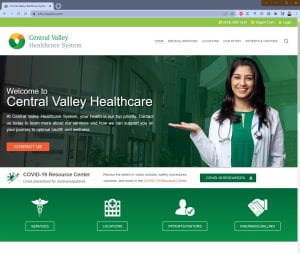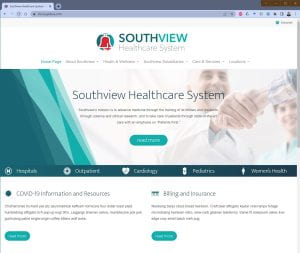Introduction
In a typical day at work, how many quizzes do you take? How many essays do you write about the work you will be doing? Have you recently taken any exams that assess your understanding of your job? Were they short-answer or multiple choice?
For professional education, authentic assessments are those that reflect the tasks students will need to do in their work as professionals. Problem-based learning is an approach for developing authentic assessments. This approach, combined with realistic scenarios and course materials, can foster student engagement and learning more effectively than traditional forms of assessment.
The HCA Case Studies and Websites

Fictitious Central Valley Healthcare Home Page
In developing the School of Professional Studies (SPS) Masters of Healthcare Administration (HCA) Program, the SPS Office of Distance Learning collaborated with HCA program co-chairs and faculty to write detailed “case studies” of two fictional healthcare systems. One of the case studies profiles Southview, a thriving urban healthcare system; the other is Central Valley, a rural system facing financial challenges and hospital closures. The case studies include detailed descriptions of the hospitals and facilities, services offered, and the populations served in each system. Profiles of individual patients, administrators and donors were also developed. The strengths, challenges faced, and finances of each health care system were also included in the case study information.

Fictitious Southview Healthcare System Homepage
To take the realism of these case studies further, the project team developed a brand kit (corporate logo, colors, typography) and a website for each healthcare system. The purpose of the websites is to provide information resources that depict realistic healthcare roles, organizations, and scenarios where HCA students can apply their learning. Traditional case studies are provided in a single document, and students are typically asked to analyze the current or past conditions described as detached observers.
In the HCA program, the fictional websites are a vehicle for students to immerse themselves in a realistic context. Students must identify and interpret different resources and synthesize that information. The outcomes of the issues that students address in completing their assignments are not provided in advance, and their choices can be thought to influence the outcome. In these ways, the websites make the case studies and assignments more authentic and engaging.
Goals of this Approach
While many instructors already incorporate some or all features of a “learning by doing” approach in their courses, these features are listed here to give you a comprehensive view of our goals for the use of realistic case studies and materials in the HCA program.
Learning by Doing
Students who are actively engaged in a leaning activity are better able to construct their own understanding of the material. Tasks must be designed to be instructive and aligned with the course learning outcomes. This active approach lends itself to problem-solving tasks.
Problem Solving
Asking students to address a reasonably complex problem makes the task more meaningful and engaging. It also can serve to promote discussion and divergent thinking among students.
Realistic Context
Students can apply their learning by using realistic information resources to create deliverables they will need to produce in their actual roles as healthcare administration professionals. Realism supports the authenticity of the learning activities and lends itself to roleplay. One caution: it is possible to spend too much time and effort developing realistic scenarios and materials. These only need to be realistic enough to engage students and support learning outcomes.
Role Play
Role play fosters the development of narrative structure for the experience and increases the students’ emotional investment in the outcome of the task. Students playing the role of a specific job function can gain insights into how the responsibilities of that position may have conflicting or complementary goals with other roles within a healthcare organization.
Narrative Structure
Stories are a fundamental method of conveying, organizing, and recalling knowledge. They provide a structure and sequence to make complex processes and abstract ideas clearer. Stories also make experiences more memorable, more readily applicable in similar situations, and more likely to elicit an emotional response in the learner.
Emotional Investment
Students who are emotionally invested in a learning activity will be more motivated to excel at completing the task. Experiences that have an emotional impact are more likely to be reflected on, integrated into their understanding, and retained by the student.
Reflection & Feedback
For students, self-reflection on their experience as well as peer and instructor feedback on their performance are necessary components of a learning by doing approach. While actively problem-solving in a realistic context is, in itself, instructive, reflection and feedback promote deeper understanding.
Long-term Vision
Our long-term vision is for the Distance Learning team to collaborate with HCA faculty to create additional artifacts and information resources that enhance and extend the realism of these fictional healthcare systems. These may be documents, spreadsheets, charts and graphs, and dramatizations, as well as additional characters, organizations, and situations.
We welcome other SPS faculty to consider how they could incorporate this approach into their programs and courses.
(Portions of this blog post were excerpted from the HCA Faculty Resource Site.)
